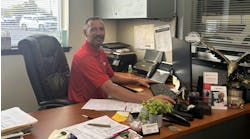WHOLESALE: Teach the next generation
Aftermarket wholesalers have to walk the fine line of having knowledgeable counter staff and keeping the training budget under control. Unfortunately, having a well-trained counter staff is a line item that too often gets reduced.
As the qualified employee pool shrinks, however, more store owners are coming around to the concept that well-trained people can be one of their biggest assets.
Steve Hoellein, for example, is banging the drum about recruiting at the high school level. "Students are hungry to find out where they're going to go after they graduate," says Hoellein, who owns Felt Auto Parts in Ogden, Utah. "Get the elite of this group."
Hoellein suggests talking to automotive trade teachers and school counselors around January or February, because many students start getting serious about looking at career opportunities right after the holidays. It's no coincidence, he says, that many skills contests get under way then with deadlines in late March. Whether a store sponsors an automotive repair skills contest or scholarship, or simply has a representative talk to the class about a career in the aftermarket field, "if everyone across the country began doing this, just think what we could accomplish," he says.
Hoellein practices what he preaches, too, hiring students to work at his store in a type of work-study program. Even if a student moves on after graduation to work as a technician, Hoellein believes he or she is better off because they know the parts side of the business, how to ask for parts and what to realistically expect.
Arcade, N.Y.-based Fred Roberts Auto Parts also is looking to the future generation of counter professionals. The Uni-Select USA company has partnered with Alfred State College, part of the State University of New York (SUNY) system, to begin an automotive parts technology program. The program, which starts this fall, is offered as a two-year associate's degree or four-year bachelor's degree curriculum in Alfred State's School of Applied Technology. Fred Roberts' Area Manager Al Mosher notes the bachelor's program can even be done in three years.
"Alfred State graduates 260 technicians a year in areas like heavy-duty, motorsports and auto body refinishing," he explains, adding that parts technology simply will be another career choice for students. "We can't wait to have that first graduate!"
Fred Roberts runs a full-fledged branch at Alfred State's Wellsville, N.Y., campus to supply student technicians with all their parts and equipment, although it's branded as the Alfred State College Parts Store. Mosher says a new building is currently under construction that will house the counter, warehouse and paint-mixing area on the first floor, with state-of-the-art classrooms on the second floor.
"In the morning, you're at the parts store on the Wellsville campus," he explains. "You get to learn layout, mixing paint, stocking and even marketing. In the afternoon, you go to the main campus in Alfred, N.Y., to take marketing and accounting classes and get into some business classes."
Mosher says it's been about a four-year process to get the concept from the drawing board to a choice in the campus course catalog. "It had to be blessed by SUNY and created within their curriculum guidelines," he says. "But Alfred State has been producing quality technicians for more than 40 years, and they met our mission of 'progress through partnership.' We anticipate about having 30 students enrolled in the program this fall."
Old dogs, new tricks?
John Caesar is the outside sales manager and training coordinator for Medina Auto Parts, a CARQUEST affiliate with five stores in Northeast Ohio. He notes that training his employees is relatively simple by combining a mentoring program, some training materials from CARQUEST and manufacturer rep presentations. What's more difficult, he says, is getting new technical information out to technicians.
"Too many technicians — young and old — simply think they're too good to attend training," he laments. "They take the attitude of 'I should be teaching the class.' But really, even if you pick up just one or two pointers at a seminar, it's worth it."
Caesar adds that it seems the unwillingness to learn is more widespread in the northeastern part of the country and has intensified in recent years. However, he notices that some shop owners are taking matters into their own hands. "I was talking to an owner just last week who said he's going to make it mandatory for his techs to have X amount of training. 'If they complete it,' he says, 'I will pay for it.'
"What better incentive is there to better yourself and get paid for it?" Caesar adds. "This is an ever-changing industry, and you need to keep up."
RETAIL: Customer skills essential
"It's amazing what people get paid for that could jeopardize the company," observes Derek Hopper, co-owner of Arizona Jobber Supply (AJS) in Tucson, Ariz. He notes that retail customers often come in from big-box stores carrying misinformation about the parts they really need.
Hopper's uncle, AJS President Jerry Conant, concurs that under-trained parts people can undermine the industry. He adds that because their store has good working relationships with many local independents, it's a little easier for AJS to weed out potentially bad hires. "If an applicant is coming in from another store, 10 to 1, we're able to find out how they really were as an employee," Conant says.
Hopper, who oversees the initial training program, tries to take a holistic approach to getting a new hire up to speed. "We've got several training methods," he explains. "We want to give them not only technical know-how, but phone etiquette, for example. The first day on the job, they're on the computer system, with an employee (as a mentor)."
Continued training also is important, Hopper says. "One Tuesday night a month, we have a 90-minute counterman meeting after close. That's when we talk about new lines, the things they want to know, the issues to address."
Hopper and Conant keep a running list of pertinent issues throughout the month, then sit down with each other a few days before the meeting to choose which items to address and to set an agenda.
Hopper stresses that while it's an open forum to address problems and complaints, it "should not be just a 'we've got problems' meeting. We also look to build them up, to recognize positive things going on."
The meeting is no-frills and stays within the 90-minute timeline so employees can get home — without the rush-hour traffic — within about a half hour of their normal routine.
Bruce Bagenstos, operations manager for the University branch of Merle's Automotive, also in Tucson, coordinates training for about 180 employees at 14 offices. An additional 140 contracted drivers are part of the mix at times. While Bagenstos doesn't use a formal training approach, he matches new staff with experienced staff and spends as much time with new hires as possible. For ongoing counter training, he ensures all branches have the proper literature for new lines, for example, and lets the training approach stay at the store level.
"For some stores, it makes more sense for the manager to break the crew up in half so one group is working while the other group is meeting," he explains. "At other stores, it works to stay a little while after close. We leave it up to what works best for them."
Steve Hoellein, president of Felt Auto Parts in Ogden, Utah, notes that his store has taken a page from the service center book by having employees trained in parts overall, but then specializing in a particular area.
"I'm the engine guy, we have an air conditioning guy, heavy duty, air brakes, etc.," he describes. "We know enough about other areas to walk a customer through what they need, but if they need specialized help, we get them to the expert."
For retail, Hoellein often encounters situations where the consumer is better off leaving the work to the professional. He encourages his four-person crew to be honest, even if it means losing a sale. "I don't want my guys to see someone in over their head and then get a return," he says. "I really find that overall, the public responds positively: 'You know, I think you're right.'"




